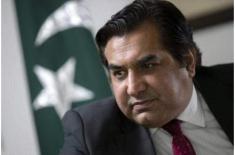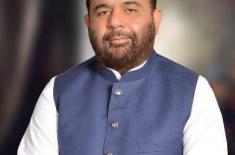
Favoritism: The 'unspoken Inequality' In Classrooms
Fahad Shabbir (@FahadShabbir) Published May 20, 2025 | 02:30 PM

ISLAMABAD, (UrduPoint / Pakistan Point News - 20th May, 2025) In an ideal learning environment, every student should be treated equally, assessed objectively, and given the same opportunities for growth. But in reality, subtle forms of favoritism often creep into classrooms, creating silent but harmful divisions.
When certain students are consistently given special treatment, whether due to personal connections, popularity, or unspoken biases, it affects the motivation, mental well-being, and academic performance of others. Left unchecked, favoritism can lead to a toxic environment, undermining trust in teachers and the integrity of the educational system. Recognizing and addressing this issue is essential for nurturing a fair and inclusive academic atmosphere.
A 2019 study by the American Psychological Association revealed that 20–30% of students reported experiencing favoritism, particularly toward high-achieving and confident peers. Similarly, a 2017 study published in the International Journal of Educational Development found that over 40% of students in Pakistan felt they faced favoritism in classrooms, especially in grading and participation.
Interviews conducted by APP from the teachers and students of the twin cities’ different educational institutions reveal that favoritism is not only present as an "unspoken inequality" but often mistaken for other behaviours. Students report that certain classmates receive advantages unrelated to merit.
Rania Imran, a student at Fatima Jinnah Women’s University, shared that internship opportunities offered through department coordinators often benefit a select few, leaving others feeling excluded. “It’s not always intentional,” she noted, “but the impact is real. When some are repeatedly chosen, the rest begin to question their worth.”
The emotional toll of favoritism can be significant. Students who feel overlooked often withdraw from class participation and lose motivation. “When others are rewarded without earning it, you start to ask yourself, why even try?” said one student. Laiba Maqsood, who is studying International Relations, openly admitted to benefiting from favoritism, acknowledged that the practice creates an uneven playing field: “It makes others feel invisible. That’s not fair.”
A student at Askria school and College, requesting anonymity, sarcastically remarked, "Even talking about favoritism in whispers can land you in deep trouble, especially if a teacher catches wind of it.
Next thing you know, you're the subject of a new 'favourite'!"
Dr. Zohaib Gillani, an instructor at Quaid-e-Azam University, in response to an APP query explained that teachers naturally tend to connect more with students who excel academically or exhibit strong character traits, interactions that may unintentionally be perceived by others as favoritism.
Miss Farwa, a teacher at Viqar-un-Nisa Noon Girls Higher Secondary Institute when asked by APP whether favoritisms exist, said, “My mission is to treat all students equally, follow the same rules for everyone, and make sure every voice is heard.”
The educators emphasized the need for self-awareness and peer feedback to help teachers identify biases. Unchecked favoritism, they warned, can damage classroom relationships, breed resentment, and lead to disengagement, undermining students' long-term academic confidence.
To counteract this, teachers described various strategies: using standardized grading rubrics, encouraging all students to participate.....especially the quiet ones.....and providing anonymous platforms for sharing feedback. One educator affirmed, “Rules are the same for everyone. That’s how we build trust.”
Professor Muhammad Ramzan, who has extensive teaching experience in the middle East, shared his insights on the issue while speaking to APP. He noted that, at times, even parents pressure teachers to give special treatment to their children, often without realizing the negative impact this can have on other students. "This kind of interference not only disrupts the teacher’s ability to maintain fairness," he said, "but also creates resentment among classmates and discourages healthy academic competition."
In classrooms across the world, he said, education is meant to be the great equalizer. But when favoritism enters, it quietly tilts the balance. It's in the extra leniency for one student, the glowing praise that never spreads far, or the internship passed quietly to someone "more familiar." The damage isn't loud, but it's lasting. Students grow wary, self-worth shrinks, and trust fades. To restore balance, educational institutions must move beyond slogans of equality and embrace daily fairness in every decision, every word, and every opportunity shared. Because real learning begins when every student feels seen.
Recent Stories

Currency Rate In Pakistan - Dollar, Euro, Pound, Riyal Rates On 20 May 2025

Today Gold Rate in Pakistan 20 May 2025

Ambassador Highlights Pakistan’s Strategic Role in Global Trade and Logistics

A Beacon of Hope in Malta: Khurram Khan, the Pride of the Pakistani Nation

Pak Women to tour Ireland in August

Moscow Metro marks 90th anniversary with focus on infrastructure, innovation

Pakistan's ambassador meets CEO BECI in Brussels

Indo-Pak Dialogue stands as only way forward to resolve all issues including cor ..

Water Sewerage Corporation reshuffles top officers

The Federal Minister for National Heritage and Culture, Aurangzeb Khan Khichi me ..

Interior Minister lauds Security Forces for crushing Indian-backed terrorists in ..

Three human traffickers arrested for defrauding citizens
More Stories From Pakistan
-
Favoritism: The 'unspoken inequality' in classrooms
8 minutes ago -
DIG Sukkur inaugurates State-of-the-Art Model Police Station in Khairpur
18 minutes ago -
Crackdown launched against transporters violating rules
18 minutes ago -
Local leaders assure full support to security forces against terrorism
18 minutes ago -
Sherry Rehman thanks parliament, public for support on child marriage restraint bill
18 minutes ago -
Dera Police intensify anti-Crime efforts with new arrest campaign
28 minutes ago
-
JKNF pays homage to departed Kashmiri leaders Mirwaiz Farooq, A G Lone
38 minutes ago -
KP extends school enrollment drive until May 31
58 minutes ago -
Pakistan, China committed to peace, progress: DG ISPR
1 hour ago -
ANF arrests 9 smugglers with over 77 kg of drugs worth Rs 25.7 mln
1 hour ago -
Solid efforts on to wipe out polio from Dera region
1 hour ago -
Welfare of police personnel top priority: DPO
1 hour ago